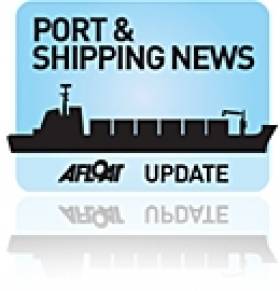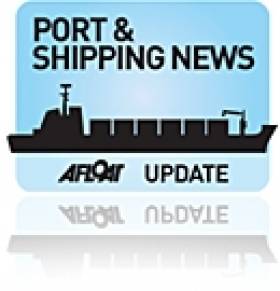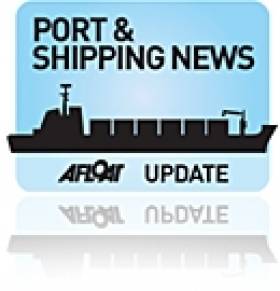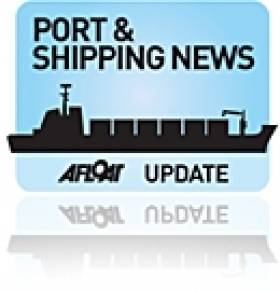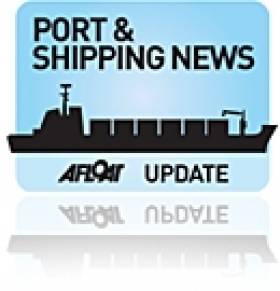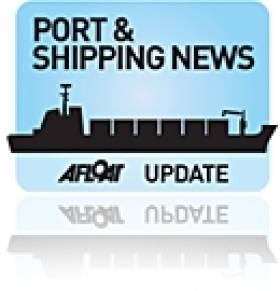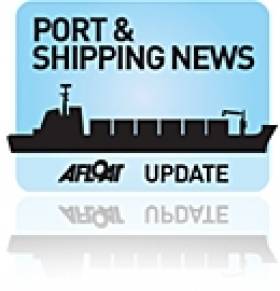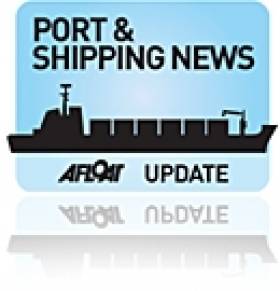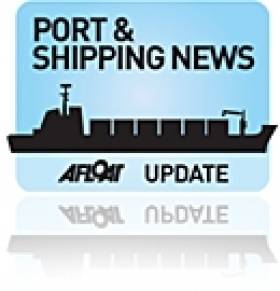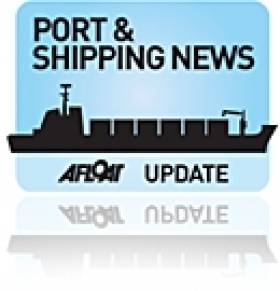Displaying items by tag: Ports & Shipping news
IMDO Shipping Review: Irish Trade Surplus, LNG Port Alliance, Bulker Tonnage Oversupply and much more
#Ports&Shipping –The latest IMDO Weekly Shipping Market Review includes the following stories as detailed below.
Irish Economy: Trade Figures - The seasonally adjusted trade surplus rose to €1 billion in August as exports increased in the month, new data from the CSO showed last week. The figures indicated that exports rose by €1.26 billion, an increase of 16 per cent compared with July, to €9.1 billion. Imports, meanwhile, were €215 million higher, up 5 per cent on the previous month at almost €4.2 billion. That left the surplus at €4.92 billion for August.
LNG: Port Alliance - The largest Port in Europe, the Port of Rotterdam, and the largest Port in Scandinavia, the Port of Gothenburg, has entered in to a new alliance as noted by World Maritime News. The aim is to speed up the establishment of liquefied natural gas as a maritime fuel. A memorandum of understanding will be signed between the Port of Rotterdam and the Port of Gothenburg.
Dry Bulk Market: Tonnage oversupply - Mark Williams, Research Manager at Braemar Seascope Ltd. , has stated shipping markets are expected to keep facing issues of tonnage oversupply, despite demolition activity reaching record-breaking levels, which will continue to exert pressure on freight rates, over the coming months, as noted by Hellenic Shipping.
For more on each of the above and other stories click the downloadable PDF IMDO Weekly Markets Review (Week 41). In addition to coverage on Afloat.ie's dedicated Ports & Shipping News section.
Ports & Shipping Review: Irish Cargoship Back In Service, Dublin Port Q3 Figures, Open Day NMCI and more
#ShippingReview - Over the last fortnight Jehan Ashmore has reported from the shipping scene where a new freight operator, Channel Island Lines began trading with the return of Irish chartered cargo Huelin Dispatch.
Dublin Port Company published third quarter statistics volumes for 2013. In summary Q3 cargo volumes are: Imports +5.9%, Exports +4.1% equating to total volumes of +5.2%.
Next Tuesday (22 October) an 'Open Day' at the National Maritime College of Ireland (NMCI) is to be held between 10:00 to 15:00hrs. International shipping companies and maritime organisations will attend to provide information about maritime careers.
The European Commission met with transport stakeholders to discuss the way forward for the new TEN-T policy as well as its funding mechanism, the "Connecting Europe facility". The European Sea Ports Organisation (ESPO) had welcomed imminent adoption of the new policy.
German operated Albatros became the final cruise caller to the Port of Cork's cruise season which was the busiest on record with 62 cruiseships carrying 123,000 passengers and crew.
ESPO’s To-Do List for the New TEN-T
#ESPOTenTlist- The European Commission this week is gathering with all transport stakeholders in two Baltic Sea capitals, Helsinki and Tallinn for the 2013 TEN-T days.
The event comes at a very timely moment for a discussion on the way forward for the new TEN-T policy as well as its funding mechanism, the "Connecting Europe facility", which are just waiting their final adoption.
European Sea Ports Organisation (ESPO) welcomes the imminent adoption of the new TEN-T policy. The new European transport infrastructure framework is, indeed, fully recognising the importance of ports as crucial nodes of the network. It can further optimise the links between sea ports and their hinterland through the multimodal corridor approach.
In view of maximising the success of this new policy, ESPO asks its members to fully benefit from this new infrastructure policy. Ports should participate entirely in the multimodal corridor approach that has been put forward by the European Commission and should submit projects. Moreover, by giving hands-on information to the Commission about their investment needs, European ports can contribute to obtaining an efficient and sustainable multimodal European Transport Network.
ESPO believes, in that respect, that European port authorities should be adequately represented in the governance structures of the multimodal corridors and actively participate in their implementation. All corridors start and end in European ports. Therefore, European ports are key actors and this should be reflected in an active involvement in the planning and development of the corridors.
Roads should not be completely neglected as ESPO further stresses that since improving road access to ports is an important element in enhancing maritime transport and hence multimodality in some areas.
In addition, for European ports, Motorways of the Sea (MoS) is a crucial aspect of TEN-T. MoS can strengthen the link between the comprehensive ports of the network and the core ports and multimodal corridors.
It is important to define more precisely how this concept will be applied in the context of the new TEN-T policy. This could and should be done in close cooperation with the ports and their experts, who deal on a daily basis with short sea shipping.
Finally, to really boost the Motorways of the Sea between European ports, the Commission and Member States should step up efforts to realise the full internal market of maritime transport and to ensure efficient custom procedures in all European regions and ports.
"We entirely support Europe's new TEN-T policy and see it as a good basis for further developing Europe's transport infrastructure into a fully fledged multimodal, efficient and sustainable network in which ports are the cornerstones. The delivery of this new policy will however depend on its implementation.A lot of aspects still need to be clarified." says ESPO Secretary General, Isabelle Ryckboat.
"ESPO and its members are prepared to give input and look together with the other stakeholders and the Commission for the best ways to ensure a full application of the goals of this new TEN-T policy. We hope in that respect that ports will be heard and that they will play the role they deserve in the multimodal corridor".
IMDO Shipping Review: Irish Manufacturing Growth,Panamax Market Overcapacity, New Shipping Bank and more
#Ports&Shipping –The latest IMDO Weekly Shipping Market Review includes the following stories as detailed below.
Irish Economy: Manufacturing Improves - The Irish manufacturing sector showed continued growth in September, with the release of the Investec Manufacturing Purchasing Managers Index (PMI) highlighting a 14-month high figure of 52.7 points, up from 52.0 in August. New orders, down 0.1 points from a 13-month high of 53.6 in August, recorded continued growth in both domestic andexport markets, leading to the rise in overall production during the month.
Container Market: Panamax Vessels Threatened by Cascading - The Panamax container market may experience overcapacity according to Lloyd's List if other carriers follow Maersk's lead to replace chartered tonnage after cascading its Triple-E 18,270 TEU capacity vessels. Cascading is the process of moving larger vessels from main trade routes onto smaller trade routes as they are displaced from the main trade routes by the entrance of even larger ships.
Finance: Dedicated Shipping Bank - Solace for second-tier shipowners has arrived as a group of shipping executives have launched the Maritime and Merchant Bank in Oslo, claiming the industry needs a financial institution to fill the void created by the main banks and lenders leaving the shipping market, due to the economic squeeze and new Basel III capital requirements. The bank has targeted capitalization of about $300m through an IPO next year.
For more on each of the above and other stories click the downloadable PDF IMDO Weekly Markets Review (Week 40). In addition to Afloat.ie's dedicated Ports & Shipping News section.
Channel Islands Freight Service Re-Opened by New Operator
#NewFreightOperator - Following the collapse of Huelin Renouf Shipping a new freight service company has begun trading.
Channel Island Lines has leased much of the machinery and equipment that was used by the former firm, which went under in August.
The company has also leased back Huelin Dispatch, as previously reported (the Irish registered ship), to run three-times-a-week between the UK and the Channel Islands.
For more on this story Channelonline.tv reports with interviews and footage of the Huelin Dispatch.
#Lockout1913 – S.S. Hare the ship that carried vital cargo food supplies from the British TUC to support 25,000 striking workers and their families during the 1913 Lockout was re-enacted yesterday, writes Jehan Ashmore.
Hundreds of people lined Sir John Rogersons Quay in Dublin's 'Docklands' where at berth No. 4 the small short-sea cargoship Ben Maye (1979/548grt) berthed alongside the last remaining campshire ware-houses.
To mark the unique commemorative voyage from Liverpool to the Liffey, the chartered cargoship coaster Ben Maye as previously reported is operated by the Ramsey Steamship Company. Coincidentally the Isle of Man based shipping company was founded a century in the same year of the so called Lockout.
Ben Maye was 'dressed overall' and her bows drapped with banners displaying her temporary renaming in the role of S.S. Hare. After the eventful year of 1913, she was sunk during WW1 by a U-Boat off the Kish Bank in 1917.
As the Ben Maye entered firstly through the East-Link toll lift bridge she was given an escort led by East coast rowing skiff's, Dublin Port Company tug sisters Shackleton and Burford and Dublin Bay Cruises excursion vessel St. Bridget. Following that she made the short distance upriver after passing the opened Samuel Becket swing-bridge.
Senior trade union official made speeches at the quayside and the organisers gratefully acknowledge the support received for the SS Hare re-enactment from the Irish Congress of Trade Unions, SIPTU, Unite, Dublin Council of Trade Union, Dublin Port Company. Also providing assistance was the RMT, the UK's largest specialist transport union and the International Transport Workers' Federation (ITF).
IMDO Shipping Review: Economy Top-Tier, Container Orders Rise, Tanker Instability and much more
#Ports&Shipping –The latest IMDO Weekly Shipping Market Review includes the following stories as detailed below.
Irish Economy: Top tier ranking in EU competitiveness table - The Irish economy recorded a strong performance in the 2013 EU Competitiveness report, released this past week, scoring particularly well in all areas of industrial competitiveness. Notable strengths included figures showing Ireland to have the second most attractive business environment in the EU and the highest percentage of highly skilled employees in manufacturing, at almost 40%
Container Market: Increasing Orderbook - Box ship orders for the first eight months of 2013 have totalled 1.34Mteu, a 205% increase on the same period last year, according to Fairplay. Raymond Yap, CIMB Securities shipping analyst, stated this could lead to a full year total which exceeds the 1.8Mteu ordered in 2011, which was the highest since the 2008/09 financial crisis.
Tanker Market: Middle East crises further compounds overcapacity - Instability in the Middle East is adding further to the woes of the struggling Tanker segment, RS Platou's head of research told Fairplay.Ole-Rikard Hammer compared the effects of the current crises in Syria, Libya and Egypt to those of the Gulf War in the early 1990's, suggesting that tanker owners should beprepared for a difficult long term outlook.
For more on each of the above and other stories click the downloadable PDF IMDO Weekly Markets Review (Week 39). In addition to Afloat.ie's dedicated Ports & Shipping News section.
#Port Policy – The Transport Committee of the European Parliament yesterday had a first exchange of view on the Commission Proposal for a Port Regulation, which was published in late May.
The European Sea Ports Organisation (ESPO) acknowledges that the Commission proposal addresses some important conditions for ensuring port cargo handling on a level playing field:
by tackling the transparency of financing in ports, by recognising the freedom to provide port services by considering the setting of charges and the minimum requirements for port services as important tools of port management.
But the Commission proposal disappoints, since it partly undermines those principles:
by intervening in the commercial freedom of ports and port authorities to vary charges according to the port management's economic strategy;
by prescribing how ports and port authorities should deal with their clients;
by imposing additional administrative burden to ports which are not competing at the European scene;
by creating an independent supervisory body.
In that overall context, ESPO and its members cannot accept the regulation proposal as it stands.
"We welcome the fact that the Commission is considering European ports as engines for growth. European ports are facing enormous challenges: growing volumes, ever-increasing ships, further globalisation, increasing societal and environmental pressure. They need a policy that empowers them to meet these challenges, not rules that create additional burden for ports without real benefit for the port industry or the users. We hope European policy makers understand our concerns and want to work with us in view of obtaining a framework that means a step forward for every single port in Europe", says Isabelle Ryckbost, ESPO's Secretary General.
ESPO fears that the Commission proposal in its current form will hamper well performing ports:
The diversity of the European port sector makes it impossible to frame all ports and their managing bodies within one stringent legal framework, without giving in on their specificity and on the particular role ports are playing for their national and regional economy.
Differences in size, geographical situation, governance, tasks, financial situation, etc. makes it very difficult to develop a set of rules that goes further than guiding principles.
Moreover, by restricting the commercial freedom of EU port authorities and interfering in port-related governance competences, the Regulation proposal could hamper the necessary transition of European port authorities towards dynamic port developers and worsen the position of ports which are already high performing.
Finally, European ports do not see the port regulation as the instrument that will improve the competitiveness of ports.
There are other, more important, factors that can enhance the level playing field in the port sector that need to be tackled: internal market for maritime transport, environmental rules affecting transport patterns and modes, unfair competition with third neighbouring countries, and burdensome customs procedures.
ESPO's full response to the proposed Port Regulation can be found HERE..
IMDO Shipping Review: Ireland Exits Recession, End to Container Rates Rise, Newbuilding Unseasonal Boost and much more
#Ports&Shipping –The latest IMDO Weekly Shipping Market Review includes the following stories as detailed below.
Irish Economy: Ireland exits recession - The Irish economy has growth once again, according to data from the CSO.
The economy grew by 0.4%in the second quarter of the year, although this was weaker than the 0.8% that many economists had forecast. In the first quarter, GDP fell by 0.6%. The growth in GDP was largely fuelled by a rise in exports and consumer spending.
Container Market: End to rate rises- Container rates rose for the second consecutive month in August, but a report from Drewry last week warned that it will not continue.
Drewry predict that the situation is likely to reverse towards the end of the year due to renewed weakness in trades from Asia. "Pricing on Asia origin trades has been buoyed by peak season volumes, but as the
trade enters the shoulder season still plagued by overcapacity, rates will come under renewed pressure,"Drewry predicted.
Newbuilding: Unseasonal August - August was an uncharacteristically good month for ship-buildersas many ship-owners took advantage of favourable pricing to invest heavily.
According to the latest report from shipbroker Golden Destiny, August ended with upward momentum in the second-hand and newbuild markets, while demolition activity declined.
For more on each of the above and other stories click the downloadable PDF IMDO Weekly Markets Review (Week 38). In addition to coverage on Afloat.ie's dedicated Ports & Shipping News section.
Arklow Shipping Adds Newbuild 'Muse' to Her Sisters
#ArklowNewbuild – Arklow Shipping Ltd's latest newbuild Arklow Muse joins 'M' class sisters as part of a mixed dry-cargo fleet of 45 vessels ranging between 3,000 – 14,990dwt, writes Jehan Ashmore.
Unlike the rest of the five 'M' class series built by Mokpo Shipyard Corporation in South Korea, the 14,018dwt Arklow Muse was completed by Daesun Shipbuilding & Engineering.
The principle dimensions of the dry-cargo vessel are 136m long, a 21m beam and draught of around 8.5m.
Her classification society is Bureau Veritas. Class notation is for +100A1 +LMC,UMS, IWS (strengthened for heavy cargo) and her four holds. For example she can load a cargo of grain totaling 18,110m3 / 639,490 sq ft.
As for her power-plant, this is a main engine of the MaK 6M 43C design with a 5400kW capacity and a Jake reduction gear Rolls Royce controllable pitch propellers delivering about 14 knots.
Arklow Muse is registered at Arklow, her Irish homeport where the company headquarters are based managing the majority of the fleet. The balance of ships are operated from the chartering division Arklow Shipping N.V., located in Rotterdam.
Coincidentally, a sister of Arklow Muse, the 2010 built Arklow Mill is underway bound for Rotterdam, having yesterday loaded at the Aughinish Alumina processing plant on the Shannon Estuary.
Earlier this year, Arklow Mill had her deadweight tonnage (dwt) increased to 14,990 tonnes making her one of the largest vessels in the fleet in terms of dwt.
The work was carried out by Dublin Dry Docks in Alexandra Basin. It is also understood that the dry-docking involved a MEWIS duct fitted to the propeller to improve greater efficiency.
In addition to Arklow Mill, the Irish flagged vessel shared the Aughinish jetty with another bulker, Aom Julia of 76,000dwt. She was unloading bauxite on the adjacent berth of the Shannon estuary facility.


























